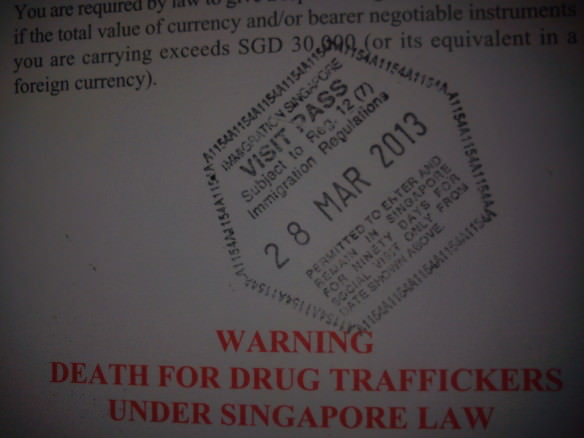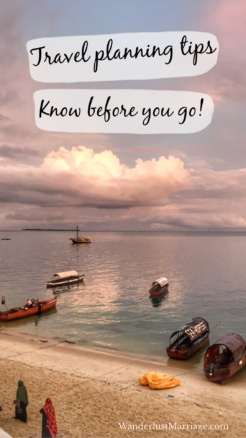Traveling is wonderful, but it can be headache if you’re unprepared. This doesn’t mean you need to have every part of your itinerary booked before you leave (far from it), but there’s some things you should be prepared for. Here are some travel planning tips to consider before heading abroad.
Research Visa Requirements for Your Destinations
For Americans, a good resource is the US State Department website. However, even that website isn’t all encompassing regarding visa loopholes like the free transit visa for China. If you search China on the US State Department site, it simply says Americans need a visa to travel there, which can be circumvented with careful planning. We essentially took a free trip to Beijing on our way to and from Australia this year, thanks to careful planning and research. Many travel agents will not be familiar with all visa loopholes, so always double check the rules for travel hacking tips.
Contact Your Bank, Carry some Cash, and Spread Money Around
Banks don’t like to lose money, so if you don’t let them know you’re traveling abroad, overseas usage could temporarily block your card. Banks do this to minimize fraud. Last year we forgot to let our bank know we were traveling to Romania, and we subsequently could not withdraw money until the branch opened on Monday. Luckily we followed one of these rules and had cash that we could exchange for Romanian Leu over the weekend.
Don’t carry too much cash around, but always have some. You should also always split up money and credit cards- don’t have all your eggs in one basket. As a general rule, we usually only carry one bank card in our wallets. We leave another bank card or two in the hotel room safe (if there is one), along with a little backup cash. This is one of the most important travel planning tips because it’s a good idea for anywhere you go.
Check with the World Health Organization to see if you need Additional Immunizations
Vaccinations for hepatitis are generally not necessary when traveling in Europe and other developed areas of the world. But in places with subpar sanitation and hygiene, travelers can be at a greater risk of exposure to preventable strains of hepatitis and should discuss their travel plans with their doctor. Check with the World Health Organization for vaccine recommendations on the areas you’ll be traveling to.
Understand and Follow Local laws, Travel Planning Tips
Countries like the Netherlands have lax laws on soft drugs. But many Asian countries have very strict drug laws. It’s a really bad idea to try and bring illegal drugs into countries like Singapore, and you are warned before landing, so you cannot claim ignorance. You should also have a doctors note if you’re traveling with prescription drugs that are considered narcotic.
Some Middle Eastern countries have strict laws regarding alcohol or talking with members of the opposite sex. Know the rules and follow them. Don’t be foolish and find yourself the subject of an international news story, or worse, thrown behind bars forever without any media coverage to pressure a government into cutting you a deal.
Minimizing Risks of Infectious Diseases
There’s been a lot in the news about the the zika outbreak which has now made its way to south Florida. Zika is particularly dangerous to pregnant women, as studies are showing that many children whose mothers were infected during childbirth are being born with birth defects. Women who are expecting or trying to get pregnant should avoid areas where Zika is prevalent.
Using bug sprays like Deet or Off are a good idea where mosquito born illnesses like zika, malaria and dengue fever are prevalent. In high risk areas it’s also a good idea to sleep under a mosquito net. You should also weigh the pros and cons of taking malaria tablets in certain parts of the world.
The World Health Organization provides valuable information down to specific regions of countries where malaria is prevalent. We’ve traveled in many of the low risk malaria regions of Thailand, Vietnam, Malaysia and Borneo. While we took a jungle cruise in Borneo and spent a few days in the rain forest, the area was still considered low risk for malaria. If we had gone deeper into the jungles of Borneo or Vietnam, the risk of malaria would have been higher. Malaria tablets can have strong side affects, so think twice before taking them in low risk areas. We’ve generally opted not to take them, and to avoid travel in high risk malaria areas.
To read more about malaria prevention and the types of malaria tablets, read this article.
Some people think that overseas travel is dangerous and mainstream media often reinforces this myth. But travel typically isn’t any more dangerous than your daily commute, and a hell of a lot more fun. So plan accordingly and enjoy this beautiful and interesting planet!
Want more travel planning tips? Contact [email protected] for details on how we can help you save money on plane tickets & hotels, while offering personalized local tips on many destinations!








 Norwegian Getaway Review
Norwegian Getaway Review  Publish Your Wanderlust Marriage Travel Story!
Publish Your Wanderlust Marriage Travel Story!
Very useful and practical tips! In fact, many of these coincides with the blog we just published on ‘tips for road tripping in Croatia and Slovenia’- just that ours are more specific 🙂
These are great tips! I’ve heard some tips about spreading the money around, but I didn’t know about the visa loophole for China. That’s really awesome! Also, great points on the malaria medication. It’s something I’d rather not take, if it can be avoided (while still staying safe).
These are some quite invaluable tips. I am a planner by nature so really can appreciate these.
These are some great trips for anyone considering overseas travel. Travel abroad isn’t scary but you do need to be prepared!
Such sensible advice – I think especially when it comes to researching local laws and customs. You really don’t to find that you’ve done all the big stuff, but not the small!
Thanks for putting this together. My pleasure to follow all of these.